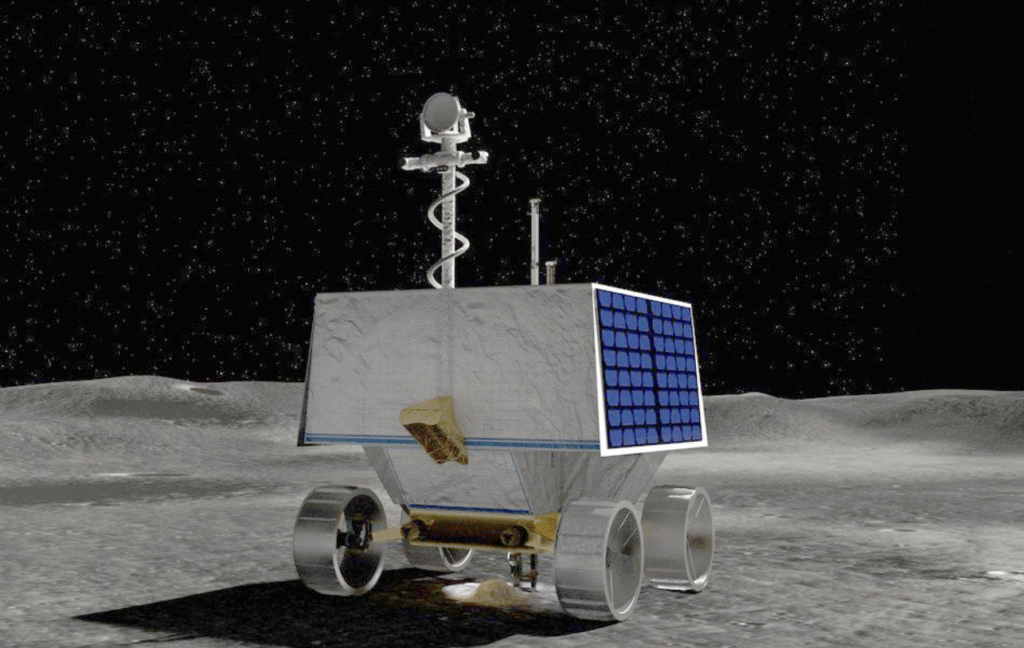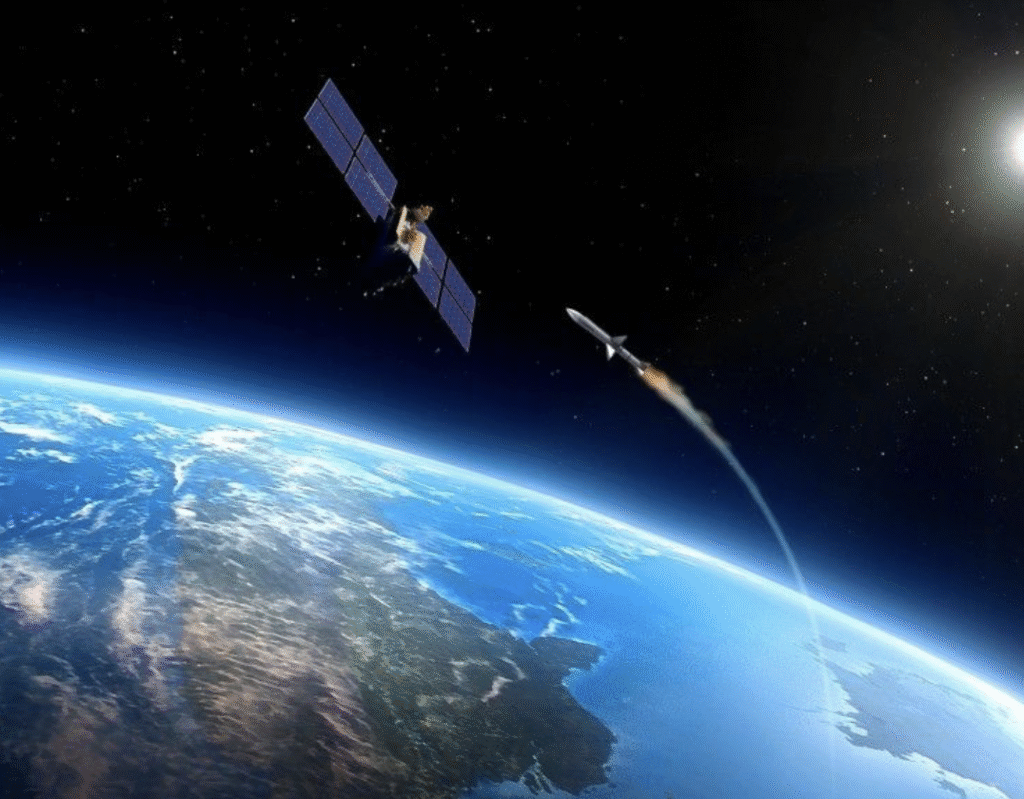Scenarios For Future Crime Off Earth
by James L. Cambias
I’m a science fiction writer. My second novel, Corsair (Tor, 2015) was a near-future hard-SF novel about space piracy. I tried to make it as realistic and plausible as possible. Apparently some of my ideas were convincing because I got invited to advise the Center for the Study of Space Crime, Piracy, and Governance on the subject.
In this blog post I want to outline some of my own scenarios for criminal activity in space. I’ve organized it by time period: 2025-2030 (Now), 2030-2050 (The Near-ish Future), and 2050 and beyond (The Future). I’ll propose ideas for bad stuff people could do in space, what kind of bad people might do them, and some things the criminals would need.
But first, some definitions. There are some terms I’m going to use over and over in this piece, so I want to make sure we all understand what I mean.
Criminal Organization: When I speak of a Criminal Organization, or Organized Crime, I mean just that — a large ongoing operation with a functional chain of command, a relatively consistent set of leaders, sources of revenue, and the ability to commit violent actions. The primary goal of a Criminal Organization is profit, though some may use ideology or nationality as a justification.
Deniable Launch Site: A facility for launching rockets, but one which the state or non-state organization which runs it can claim is not under their actual control. So if, for example, Texas was largely controlled by antigovernment rebels, so that Federal authority didn’t extend much beyond a couple of airports and military bases, and if Mexico was backing those rebels, then a rocket base in rebel territory could launch vehicles for Mexico, but Mexico could plausibly claim to have nothing to do with it. The difference between a Deniable Launch Site and a Secret Launch Site (see below) is that everybody knows the Deniable one exists, they just aren’t sure who’s really in charge.
Legal Business: A business which is doing something generally accepted as lawful, for profit, operating according to the laws of whatever countries it is located in. Legal Businesses may try to evade rules, but they can’t openly break the law and their managers and owners are accountable for what they do. Legal Businesses have to worry about regulations, laws, and public opinion.
Legitimate State: A real country. The government controls its territory, is accepted as the legal government of that territory by the people who live there and most other states, and performs all necessary functions of government in that territory (or hires Legal Businesses to do them). Legitimate States have to respect international opinion, public opinion in their own territory, and international laws and treaties. They usually cooperate with other Legitimate States.
Rogue State: A Rogue State is a country which does control its territory and performs all necessary functions — but does not respect international laws and treaties, disregards international (and sometimes internal) public opinion, and does not cooperate with most other Legitimate States. Rogue States eventually either reform and seek legitimacy, or collapse into “failed” states, because being everybody’s enemy is tiresome and expensive.
Secret Launch Site: Unlike a Deniable Launch Site, a Secret Launch Site is one which is not known to the outside world until something goes shooting into orbit. This means they are usually short-lived, which in turn means the vehicles they can launch must be the sort of thing you can put in orbit atop a missile which fits into a shipping container or a semi trailer. A Secret Launch Site needs a remote location, which adds more logistical strain.
Terrorist Group: An organization devoted to advancing a particular ideology through extra-legal violence. They vary widely, but most have some kind of chain of command, and sources of funds and equipment. Over time, Terrorists tend to decline into straight-up Criminal Organizations, unless they are successful at their goals — at which point they likely become a Rogue State.
Now that we know what we’re talking about, let’s look at some scenarios.

NOW (2025-2030)
Assumptions: For this period we will limit our space bad guys to existing technology and space infrastructure. Space is full of communication satellites, Earth observation satellites, science payloads, and probes. Human presence in space consists of half a dozen people aboard the ISS, possibly one or two smaller stations, and capsules going to and from those stations. We may see a manned trip to the Moon in this era, but it’s likely to be a one-off. Similarly, we assume the world political/diplomatic environment remains about as it is now, and the legal frameworks are unchanged.
Protection Rackets (Low Orbit): I’m kind of surprised nobody has already tried this. Set up a nonprofit organization or even a mostly-fictitious Legitimate Business, preferably in a Rogue State or a country with dodgy financial enforcement laws. Pick someone who operates satellites in Low Earth Orbit (up to about 2000 kilometers above the Earth’s surface), and then let them know they can “insure” their birds with a generous donation or payment, which the dodgy NGO or company hands off to the bad guys. If the satellite operators don’t pay up, shoot a suborbital missile at their vehicle from a Deniable or Secret Launch Site. The Houthis have been doing something very much like this against ships in the Red Sea — all they need to extend their reach to space is some better missiles.
Likely Actors: The obvious perpetrators would be a Criminal Organization, but Terrorists could get in on it, especially if they’re targeting satellites owned by their ideological enemies.
What They Need: As I said, I’m surprised nobody has tried this, because the requirements are pretty minimal. You need a launch site, and one of many off-the-shelf ballistic or heavy surface-to-air missiles. That’s about it.
Protection Rackets (Geosynch Orbit): This is the same basic M.O. as the low-orbit protection racket, except that you can’t just lob a suborbital missile at a satellite overhead. Reaching geosynch requires a lot more energy (about 50 percent more), and as anyone who knows anything about rockets will tell you, that means a much bigger launch vehicle. No mere ballistic missile will do the job — you need a heavy rocket like an Ariane 6 or a Falcon Heavy. This puts it beyond the reach of most terrorists and criminals, and it means if a Rogue State puts something in geosynch and starts messing with other people’s satellites, it’s an act of war.
So we’re safe from this, right? Not quite. If you can get control of a vehicle that’s already in geosynch, then you can maneuver it to collide with other objects in that orbit. And that means you can charge the owners big bucks for not doing it.
Likely Actors: Anybody who can spoof the control mechanisms for satellites in geosynchronous orbit. This may not be as impossible as it sounds, because of course satellites and encryption technology get old and obsolete. A bird with unbreakable data security launched in 2010 may not be so impervious in 2025 (especially if the crooks or terrorists messing with it have help from a nation-state’s intelligence agency passing them information).
What They Need: A laptop and a satellite dish antenna, and some stolen technical data. Not much else. This would make a geosynch protection racket very hard to stop.
Terror Attacks: Exactly what it says on the tin. Damaging or destroying spacecraft purely for the sake of destruction, in pursuit of some political or ideological objective. And of course that objective doesn’t have to make sense to anyone but the people doing the attack. Any of the methods used for Protection Rackets can be used by terrorists. They would likely prioritize attacks against crewed spacecraft rather than satellites, for greater shock effect.
The really alarming aspect of space terror attacks is that they don’t have to minimize collateral damage. If terrorists were to blow up the International Space Station, it would create a massive cloud of debris which would likely damage a great many other vehicles in low Earth orbit. That’s a bad outcome for criminals trying to make a profit, but terrorists might consider it a bonus.
The downside — and this is likely one reason we haven’t seen much space terrorism yet — is that most crewed missions are run by government space agencies, and governments with space agencies can come down very hard on terrorists and their sponsors. However, as the number of private space missions and space stations increases, that might change. Would the U.S. government respond as strongly to an attack on a station owned by Elon Musk? Would it matter which party was in charge in Washington at the time?
Likely Actors: Terrorist groups, obviously. Rogue States might try to pull this off using a terror group as a deniable proxy, but their leaders would have to be very confident or very crazy to take the risk.
What They Need: Could be as simple as some suicidal operatives armed with MANPADS hiding out near a launch site, or a deniable launch site for missiles capable of reaching low orbit. The real nightmare scenario would be terrorists intent on causing as much destruction as possible gaining control of a vehicle in geosynchronous orbit and using it to ram others, thereby creating a big debris field and knocking out communication and weather satellites for years to come.
Theft of Service: This is the most benign kind of space crime — so benign that it may already be going on without anybody noticing. Quite simply, this is “phone phreaking” using satellites. If you can make use of someone else’s communication or reconnaissance satellites, why bother launching your own? Anybody who wants secret communication channels might try to figure out how to spoof satellites to allow illicit transmissions. Crooks and rogue states might want to use spy satellites to keep tabs on enemies. A spy agency might want to get covert access to some other country’s satellites so that even if their own side’s birds get shot down during a war, they can still make use of neutral satellites.
Likely Actors: Spy agencies, criminal organizations, terror groups, or even just bored teenagers.
What They Need: A source of inside information from a satellite communications company, their suppliers, or subcontractors. This gives the spy agencies an advantage, but you never know who might be rummaging through the dumpster out back on weekends, looking for printouts and post-it notes.

THE NEAR-ISH FUTURE (2030-2050)
Assumptions: For the next couple of decades we will assume some kind of crewed mission to the Moon, almost certainly making use of In-Situ Resource Utilization (ISRU), which is to say, mining for ice and other materials to produce rocket propellant and oxygen. There may be a permanent or at least long-term human presence on the Moon. We can expect more space stations in low Earth orbit, and unmanned missions to some near-Earth asteroids. There may be some exploratory missions to Mars, but I honestly don’t think a permanent colony will exist there in this time frame.
I’m reluctant to predict future political developments, but I think India will take a bigger role on the global stage, either as part of a hegemonic partnership with America or China, or as one of several Great Powers in a multipolar arrangement. Russia, on the other hand, seems doomed to contract to a regional power at best. Open war between major powers seems unlikely, but it’s absurd to think they’ll stop competing and attempting to undermine one another covertly.
Obviously the crimes of the Now period can also take place in the Near-ish Future, but we get some new categories.
Illegal Salvage: The thing about space right now, and in the near future, is that you have to bring along everything. That means that any mass in orbit has value simply because it is already in orbit. Even a “dead” satellite in space is worth something. As space industry begins to develop, salvage of old spacecraft could become quite lucrative — and that means some salvagers may not let matters like legal ownership stand in their way. Edge cases might exist where the legal title to a given spacecraft is unclear or contested. A salvager might argue that abandoned vehicles are up for grabs. Some owners may not notice that their birds are being snatched. The sheer difficulty of trying to prevent unauthorized salvage might make it profitable.
Likely Actors: Rogue States might simply defy international law and take inactive satellites to use for parts or raw materials. Dodgy corporations might do the same, moving fast to get paid and then disappear into legal limbo after laundering the profits. Organized Crime groups might get into the act, possibly working with one of those other two types. Even respectable governments could try to use the issue as a legal wedge to get concessions.
What They Need: Some kind of maneuverable space tug, almost certainly unmanned, and a place to take the salvage. To make the whole thing possible the tug has to be able to perform more than one recovery, so that the cost of launching it is offset by the profits of illicit salvage.
Resource Poaching: Under current rules, no country can make territorial claims on astronomical bodies. However, space missions on the Moon and elsewhere can establish “safety zones” — a radius of several kilometers which other missions shouldn’t cross. For safety. But of course if your “safety zone” just happens to include a major resource deposit, then as long as your mission continues, you have effectively claimed it for your country or corporation.
Of course, it’s one thing to draw a line in the regolith, it’s quite another thing to enforce it. A hundred years ago oilmen developed transverse drilling as a way to poach on other outfit’s leases. (“I drink your milkshake!”) One can imagine similar shenanigans involving subsurface ice or water on other astronomical bodies.
And since almost all economic activity on the Moon is likely to be done by robots or remote-operated rovers, it seems plausible that one operation’s rovers could “accidentally” stray into another’s safety zone, especially if that’s where the valuable resources are.
All of this poaching depends on the fact that adding security fences or patrols to a Lunar or Martian mining project would be eye-wateringly expensive, and could make the difference between profit and bankruptcy. Nations or companies may decide that a certain level of poaching is an acceptable loss, not worth the cost of prevention.
Likely Actors: This isn’t something you can do from your bedroom. You need to have your own Lunar or Martian project already. That does rather limit the list of suspects, but as more agencies and businesses establish presences in space, the chance that one of them may cheat increases.
What They Need: Robots, spaceships, and — most importantly — some way to make use of the resources they’re poaching.
Space Hostage-Taking: Now we’re getting close to classic eyepatch-and-Jolly Roger space pirate stuff. Humans in space means other humans can threaten to harm them in exchange for money, or to accomplish some political goal. The tricky part is getting armed pirates aboard a crewed space station or spacecraft. Once that’s accomplished, it’s hard to see what the crew can do to resist.
Hostage-taking for profit can use the same kind of money-laundering channels as the Protection Rackets above. As long as the bad guys actually have their hostages they’re pretty safe: no nation-state can just lob a missile at a space station or capsule if there are hostages aboard. Getting away is not going to be easy, though.
Likely Actors: Organized crime could do it — Latin American cartels and the Italian Mafia have always had a thriving sideline in kidnappings for ransom — but the potential downsides are immense. Terrorists would love the idea, and might not consider personal survival very important.
What They Need: A way to get into space, either using a Secret or Deniable launch site and some space hardware acquired through a national sponsor, or a commercial carrier which can be tricked or bribed into taking up a bunch of goons. A way to launder money, already discussed. And finally a way to get down again without getting blown up or captured. The best option would probably be to keep one or two hostages with you, and land your capsule in failed state territory, or just at sea in a poorly-patrolled region so your own boats can get there before the Marines.
Squatting: If somebody has gone to all the trouble to launch a space station, or even a surface base on the Moon, but they aren’t using it at the moment, why not just move in yourself? If you can swing public opinion your way, then the rightful owners are going to look like the bad guys if they try to evict you, and exactly how you get someone out of a space station by force is a very difficult problem to solve. The squatters could occupy the facility as a form of political protest, or genuinely try to make a go of settling there permanently.
Likely Actors: The usual suspects of professional crooks or terrorists probably wouldn’t be interested in space squatting. Instead, one might expect this of activist groups — people rabidly for or against space colonization, groups trying to “raise awareness” about some cause, or possibly supporters of a nation-state whose leaders believe they have been denied their rightful place in the cosmos. They probably won’t be murderously violent, but for that reason are more likely to gain public support.
What They Need: A way to reach their target. That makes Lunar squatting almost impossible in this time period, but anybody who can launch, or purchase seats on, a crewed mission to low orbit might try to take over a space station.

THE FUTURE (2050 Onward)
Assumptions: If there’s nobody doing stuff in space there isn’t much opportunity for crime, so we will assume that human and industrial activity does continue growing in the second half of the century. Somebody‘s going to go to Mars, somebody‘s going to start mining asteroids and the Moon, and, most likely, somebody‘s going to try to prey on them. A big superpower-on-superpower war seems unlikely, but it seems equally unlikely that national and ethnic rivalries will just fade away.
Actual Piracy: Nobody will start space industry to make cheap stuff. The horrifying capital cost means space mining and manufacturing will focus on very valuable products — mining platinum, gold, and radioactive elements; or manufacturing materials for use in space. “Valuable products” is another term for “loot” if you’re in the space piracy business. Quite simply, as soon as expensive stuff gets made, someone will try to steal it.
In my novel Corsair I had my space pirate hijacking payloads of Helium 3 bound to Earth from the Moon, but cargoes of precious metals would also be worth diverting to a pirate-controlled landing zone. In the book the pirates hacked the guidance of payload carriers, but a simpler brute-force method might be to use a space tug to grab the cargo and boost it onto a new course.
Meanwhile, in deep space, colonies in need of resources might be willing to pay for a discount source and not ask too many questions about where the seller got their merchandise. During the colonial era in the New World, colonial governors often turned a blind eye to smuggling because their settlements needed what the smugglers were selling.
Likely Actors: Payload piracy would naturally attract organized crime gangs. Terrorists could use it as a way to get funds, but otherwise probably won’t be interested. A Rogue state probably wouldn’t risk getting directly involved in the actual piracy, but could well serve as a good no-questions-asked customer for stolen payloads of precious metals.
What They Need: A way to take control of a payload or a quantity of goods. In space that means hacking the control systems or overwhelming them with brute force. On the surface of the Moon or Mars it means sending people or a robot to wherever the stuff you’re stealing is kept, grabbing some, and getting away. Important safety tip: on the Moon, tire marks in the regolith will show everyone where a thief came from and went for billions of years.
Criminal Metal Reserves: This is an interesting possibility for a future “gray market” business. Space pirates or other crooks might launder their money by investing in perfectly legitimate mining operations on asteroids or the Moon. What this creates is a stockpile of something valuable which can then be used to conduct shady transactions or back new enterprises — all without bringing it back to Earth!
Here’s how it works. The Mafia (say) invests in a project to mine platinum on a Near-Earth asteroid. The robot mining machines dutifully process the asteroid surface regolith, creating a store of platinum ingots. The Mafia can sell some of those ingots to (say) a Latin American cartel, and now the cartel has hard currency in a safe place which it can use to pay others in the shadow economy. They might swap some of it back to the Mafia for services rendered, or trade it to the Japanese Yakuza. Eventually there’s a whole banking system on the surface of the asteroid consisting of little piles of platinum and robots moving ingots between them.
Note that the Mafia might not need to actually run the mine producing the platinum: they could easily just launch a robot to that asteroid and steal enough precious metal from the legitimate miners to start their criminal bank.
Likely Actors: Criminal organizations would likely take the lead in this kind of operation, although a Rogue State with an asteroid mine could become the paymaster for a whole network of illicit clients.
What They Need: Either a controlling interest in an asteroid mining operation, or a way to steal stuff from someone else’s mining project. That’s about it, really — the rest is bookkeeping.
New Protection Rackets: With more people and stuff in space comes more opportunities for bad guys to extort money by threatening harm. If you can gain control of a spacecraft you’ve got a weapon which can menace just about everything it can reach, both in space and on the ground, offering the possibility of a big payoff — though there’s no repeat business. Crooks on the Moon or Mars can use ancient time-tested techniques like threatening to beat people up or break their stuff, relying on the fact that the nearest U.S. Marshal may be on another planet.
Likely Actors: Criminal organizations and terrorists might do this. Another possibility would be a struggling colony operation. If you’re stuck on Mars and need supplies, threatening the people in the nearest thriving base would be one way to keep going.
What They Need: A way to reach whatever they’re going to be threatening. Anybody who can do Actual Piracy (above) can weaponize a payload. On another celestial body the crooks need a haven where they can fence their stolen goods, and live without constant fear of arrest. (See Pirate Ports, below.)
Pirate Ports: Pirates, whether human or robotic, need some kind of safe haven. A place to resupply, a place to repair and upgrade equipment, and above all, a place to sell what they’ve stolen. The most famous pirate port in the Age of Sail was Tortuga — an island off modern Haiti with no law but the pirates themselves. But Tortuga wasn’t the only pirate port, not by a long shot. Some others have names you may recognize: Port Royal, Nassau, Charleston, New Bern, Providence — and New York.
The fact is, nearly all colonies in the New World acted as pirate bases from time to time. When the pirates had a letter of marque and called themselves privateers it was even perfectly legal. Other times, the authorities just kept their eyes and mouths shut. There were many reasons, but the simplest was that pirates were good business. They sold their loot at knockdown prices, they provided a much-needed influx of cash, and they supplied goods that imperial tariffs and regulations made scarce. And of course, if pirates are using your town as a base, that means they know better than to attack any ships using your port.
Pirate ports in space would have to be places beyond easy reach of Earth-based law enforcement: asteroid bases, possibly Mars colonies, maybe private space stations. They must have some form of legal existence, some flag to shelter under. A Tortuga flying no flag but the Skull and Bones could easily find itself on the receiving end of a cargo of weapons-grade plutonium with detonators included at no extra charge. But a space station owned by a Luxembourg corporation is under European Union protection, so as long as the colony director can swear he had no idea those people selling mint-condition “salvaged components” had stolen them, everything’s cool.
Likely Actors: While any colony might be in dire straits and resort to dealing with pirates to survive, there’s a greater likelihood if their parent countries are already very corrupt or are playing diplomatic footsie with Rogue States. Note that a Pirate Port doesn’t have to have any actual humans living in it — an automated repair and refueling station can serve unmanned pirate craft, and the machines might even make deals without informing the mammals back on Earth. If Mining Station #4 shows unexpected propellant depletion, but an unexpected surplus in platinum production, who’s going to complain?
What They Need: As described, a base, some plausible legal cover, some goods and services pirates will pay for, and a fair amount of moral flexibility.
Smuggling: Anywhere you have people, you’re probably going to have people who want something they aren’t allowed to have. And in that situation, you have the potential to make big profits by supplying that demand. Also, once you have illegal profit-making off Earth, you’re probably going to need a way to get those ill-gotten gains back to your own greedy hands. All of which means you’re going to have smuggling to space as well as smuggling from space.
How do you do that, in a situation where every gram counts? Well, first of all, smugglers have been mis-labeling cargoes since the invention of writing. As long as the launch operation is sufficiently clueless or corrupt, those “personal supplies” or “miscellaneous items” can be whatever the people on Mars will pay good prices for.
Meanwhile, smuggling things to Earth is actually pretty simple. All you need is some kind of heat shielding to keep the payload intact, and a way to recover it once it hits the ground.
Smugglers can also move stuff around between points in space. Mars colonies run by Earth governments which are on bad terms with each other may decide to trade necessities off the books. “Outlaw” Mars colonies run by rogue states or private organizations can trade illegally with legitimate colonies (suggesting that a good business model for a colony like that might be to produce something like tobacco or marijuana).
Likely Actors: Almost anybody, really. Governments won’t do it, or at least won’t admit to doing it, but people who work for them might. Private operations might. And organized crime gangs have been smuggling forever. The only ones not on this list are terrorists. While a terror group might try to smuggle something nasty onto a space station, or might act as a criminal organization and smuggle to get funds, there just isn’t much shock value in giving people things they actually want.
What They Need: Someone to turn a blind eye for a few minutes during cargo loading, customers, and a product.

CONCLUSION
How likely are these scenarios, really? Obviously some are more plausible than others. I suspect Theft of Service is already going on, and unfortunately orbital terrorism of one kind or another seems almost inevitable. Space smuggling arguably began when John Young brought a contraband corned-beef sandwich aboard Gemini 3 in 1965. Resource poaching depends on how scarce certain resources are. If there’s only one good source of water ice on the Moon, then whoever tries to claim it (for “safety”) will have to guard it well. But if asteroidal platinum is common, nobody’s going to bother claim-jumping or stealing. We still don’t know enough to predict what people will try to take illegally, but we can try to devise ways to deal with it before it happens.
One whole category of crimes are absolutely inevitable, but I’ve left them off this list because they can be done anywhere: personal violence. There will be (have been?) fistfights in space, assaults of various kinds, and at some point the people of Earth will get the news of the first murder in space. Leaving the planet won’t stop humans from being humans, after all.

